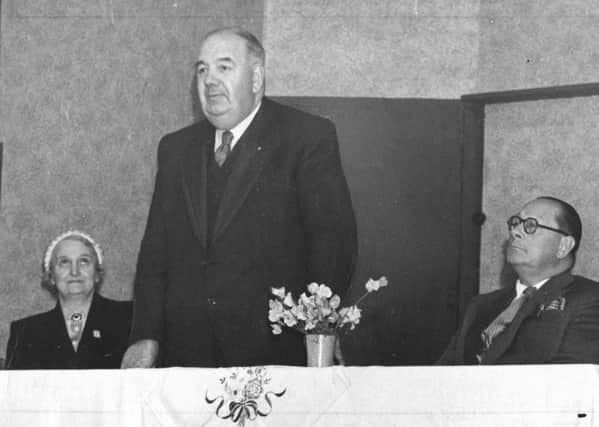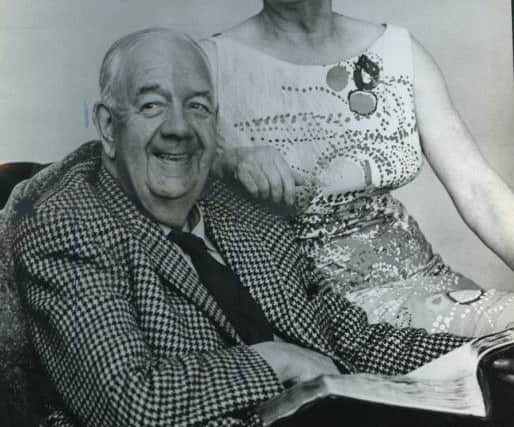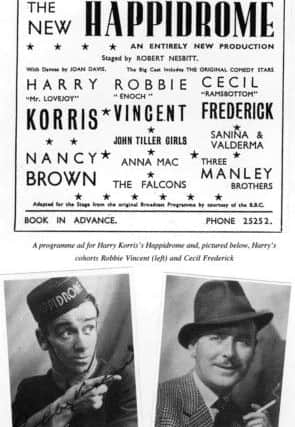Barry Band: Happy chappy who entertained Blackpool


Here’s a refresher about the comedian who was born in Douglas, Isle of Man, in October, 1891, and died in Blackpool on June 4, 1971.
Harry was a pierrot entertainer when he came to Blackpool in 1931 to join the Arcadian Follies at the South Pier until 1939, when he was signed by Tom Arnold, a top London producer, to star in variety tours, pantomimes and a 1940 summer revue in Douglas.
Advertisement
Hide AdAdvertisement
Hide AdBut his triumphant return to his home town was halted by the Second World War. The Isle of Man was “off limits.”


Tom Arnold switched the show to Harry’s adopted town and Blackpool’s Grand Theatre opened it with the clever title Blackpool One (the theatre’s telephone number).
Too clever by half. Three days later the wartime censor ordered the name to be changed. The use of Blackpool in the title would have given German infiltrators their location.
The title became It’s A Funny Thing, with Harry billed as Blackpool’s Other Tower.
Advertisement
Hide AdAdvertisement
Hide AdIn the spring Harry had filmed with Frank Randle in the army comedy Somewhere In England and the two stars were at the premiere at Blackpool’s Palace Pictures, in August.


The question at the Grand was: Could the 49-year-old stalwart of the folksie follies front a modern revue with ritzy sets, the Tiller Girls and a well-known supporting star in Tessie O’Shea?
He was a success, but there was one disappointment to Harry’s arrival in the big-time.
Years later he explained: “All my life my ambition had been to see my name in lights on the front of a theatre. When my chance came at the Grand it was wartime and everything was blacked out.”
However, there was compensation.
Advertisement
Hide AdAdvertisement
Hide AdIn the 1930s and 40s, stars were made by radio and Harry devised the comedy series Happidrome.
The BBC tried it as a series of six shows in February and March, 1941. Success was immediate and it ran for 52 episodes.
In the series Harry was Mr Sheridan Lovejoy, a former music hall performer who acquired the Happidrome theatre and became a bit “high and mighty.”
Comedy flowed between Lovejoy and his stage manager Ramsbottom (Cecil Frederick) and his troublesome call boy Enoch (Robbie Vincent).
Advertisement
Hide AdAdvertisement
Hide AdEnoch’s catchphrase “Let me tell you” quickly caught on, as did his boss’s lament “If ever a man suffered.”
The theme song “We three in Happidrome” is remembered by many who grew up in the 1940s.
Harry and his cohorts toured in a Happidrome sketch, starting at Blackpool’s Palace Theatre in April, 1941, and Tom Arnold presented a new Happidrome summer show at the Grand, produced by Robert Nesbitt.
The show did a West End season in 1942, followed by a 1943 season at the Grand.
Advertisement
Hide AdAdvertisement
Hide AdHarry made another army comedy – Somewhere In Camp – with Frank Randle and a Happidrome film in 1943.
Two more long runs of the Happidrome radio series made it second in audience numbers to Tommy Handley’s ITMA show.
There were 200 episodes with a peak of 12 million listeners, ending at Christmas, 1947.
A spin-off show was called Mr Lovejoy Goes to Paris but it is uncertain whether it was for radio or a stage show.
Advertisement
Hide AdAdvertisement
Hide AdIn 1950 Harry took the unusual step, for a performer, of taking voluntary retirement. He was nearly 60 and “comfortable.”
He sometimes depped for sick artists in Blackpool shows and had parts in the odd TV series, including Granada’s Our House in
1960.
In Blackpool he lived in Dunes Avenue, Squires Gate, before a short move round the corner into Lytham Road.
Harry raised funds for Rotary charities and was president of the South Shore club for a year.
Advertisement
Hide AdAdvertisement
Hide AdHis wife, Connie, was a Blackpool councillor for a few years.
Two years after Harry died, the new owner of his house found two tea chests full of scripts, programmes and photos from his life in show business.
The ephemera found its way into the hands of collectors.